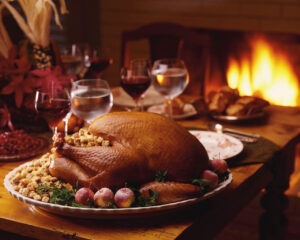Travel safety tips for your Thanksgiving holiday
 NATIONWIDE –The Thanksgiving week ahead is one typically filled with travel, a busy schedule and potentially bad weather.
NATIONWIDE –The Thanksgiving week ahead is one typically filled with travel, a busy schedule and potentially bad weather.
“Don’t let this hectic time of year sidetrack you from safety on the road,” FEMA Region V Administrator Andrew Velasquez III, said. “Take some time now to talk to your family about how to handle a travel emergency, and stockpile necessary supplies in your car in case you become stranded.”
Remember to take these simple steps to help ensure safe travel for you and your family:
Know the risks before leaving home
Listen to the radio or television for the latest weather forecasts and road conditions. If bad weather is forecast, drive only if absolutely necessary.
Keep your gas tank above half-full
When temperatures are extremely cold, condensation can build up in a near-empty gas tank, potentially freezing fuel lines and leaving you stranded.
Check or have a mechanic check the following items on your vehicle:
Antifreeze levels to ensure they are sufficient to avoid freezing.
Brakes must be checked for wear and fluid levels.
Exhaust system must be repaired as necessary. Carbon monoxide is deadly and usually gives no warning.
Fuel and air filters must be replaced as needed.
Battery and ignition system should be checked to make sure it they are clean and functioning properly.
Heater and defroster must be checked to ensure they work properly.
Lights and flashing hazard lights must be checked for serviceability.
Thermostat must be checked to ensure it works properly.
Windshield wiper equipment should be repaired if there are any problems and should maintain proper washer fluid level.
Install good winter tires to make sure the tires have adequate tread.
Have an emergency supply kit for your car in case it’s needed. Include the following items:
Jumper cables should be present along with the consideration of including flares or reflective triangles.
Flashlights should be packed with extra batteries.
First aid kit should be readily available with any necessary medications, baby food or diapers.
Food of non-perishable items such as canned food, and protein rich foods like nuts and energy bars should be packed.
Manual can openers are also a good thing to have on extended trips.
Water is an essential item and travelers should pack at least one gallon of water per person a day for at least three days.
Basic toolkit should be stored in the vehicle including pliers, wrench, and screwdrivers.
Radios with extra batteries or hand cranks would be well advised traveling items as well.
Cat litter or sand is a good thing to have for better tire traction, in case your car gets stuck. You can also pack a shovel in case your car needs to be dug out after a heavy snowfall.
Ice scrapers are always good to have ready in winter weather.
Clothes – warm clothes, gloves, hat, sturdy boots, jacket and an extra change of clothes for the cold would be a wise packing choice.
Blankets or sleeping bags would also be a good idea to stay warm if stranded in the cold.
Charged cell phone and car charger is a necessity in this day and age.
Pet supplies like food and water are good to store in case traveling hazards occur.
You can always find valuable information to help you prepare for winter at www.ready.gov/winter-weather, and click here to watch our video on preparing your car for weather emergencies. Bookmark FEMA’s mobile site http://m.fema.gov, or download the FEMA app today to have vital information just one click away.
FEMA’s mission is to support our citizens and first responders to ensure that as a nation we work together to build, sustain, and improve our capability to prepare for, protect against, respond to, recover from, and mitigate all hazards.
Follow FEMA online at twitter.com/femaregion5, www.facebook.com/fema, and www.youtube.com/fema. Also, follow Administrator Craig Fugate’s activities attwitter.com/craigatfema. The social media links provided are for reference only. FEMA does not endorse any non-government websites, companies or applications.


